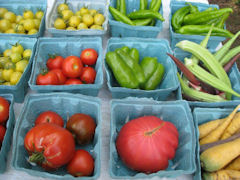by James A. Bacon
Everyone has heard the Chinese proverb, “Give a man a fish and you feed him for a day. Teach a man to fish and you feed him for a lifetime.” With a little tweaking, the aphorism could well be adapted to the philosophy of Tricycle Gardens, the urban farming nonprofit that I profiled in “Oasis in the Food Desert“: Give a man a tomato and you feed him for a day. Teach him to grow his own, and you feed him for a lifetime.
A lot of well-meaning people are worried about the poor nutrition of Americans in general and inner-city dwellers in particular. Obesity is epidemic, along with associated chronic diseases like hypertension, diabetes and arthritis. The traditional model for feeding the poor — food stamps, soup kitchens, and the like — don’t seem to be working. In that model, middle-class taxpayers and church goers give to the poor and ask nothing of the recipients. The consequence is that poor people in America are better fed but not necessarily healthier.
Tricycle Gardens is not a charity in the traditional sense. It doesn’t breed dependency. Its mission is to bring wholesome, healthy fruits, herbs and vegetables to residents of the inner city who don’t have easy access to grocery stores. But the social enterprise hands out relatively little free produce. It s purpose is to encourage people to start their own back-yard plots and community gardens. Tricycle Gardens is really in the business of dispensing knowledge and its goal is to encourage self reliance and self sufficiency.
Compare that to a recent Virginia Department of Social Services initiative to encouraging food stamp recipients to eat healthier food. Instead of dispensing Supplemental Nutrition Assistance Program (SNAP) benefits to everyone on the same day, the department will break recipients into four groups that receive their benefits on different days so families can access fresh food before it sells out.
“Our hope is that our customers will have better access to healthy and nutritious food choices when they shop,” said Social Services spokesman Pat Karney, as quoted by WTVR. “Hopefully this will allow the retail community to adequately restock shelves at the first of the month and spread out the demand for the product over the first several days of the month.”
I find it hard to imagine that Social Services is striking at the root of the problem but I suppose it’s worth a try. At least the department is trying something different.
I also don’t know if Tricycle Gardens can change the dietary culture of Richmond’s inner city. The program is a work in progress. But I expect it will make a bigger difference in the long run than tweaking the SNAP program. As Executive Director Sally Schwitters observes, people who raise garden foods become more invested in the food. They take pleasure of eating what they have grown.
Not many people take pleasure in a hand-out.



